6 Triceps & Shoulder Exercises That Erase Bat Wings After 50 (No Floor)
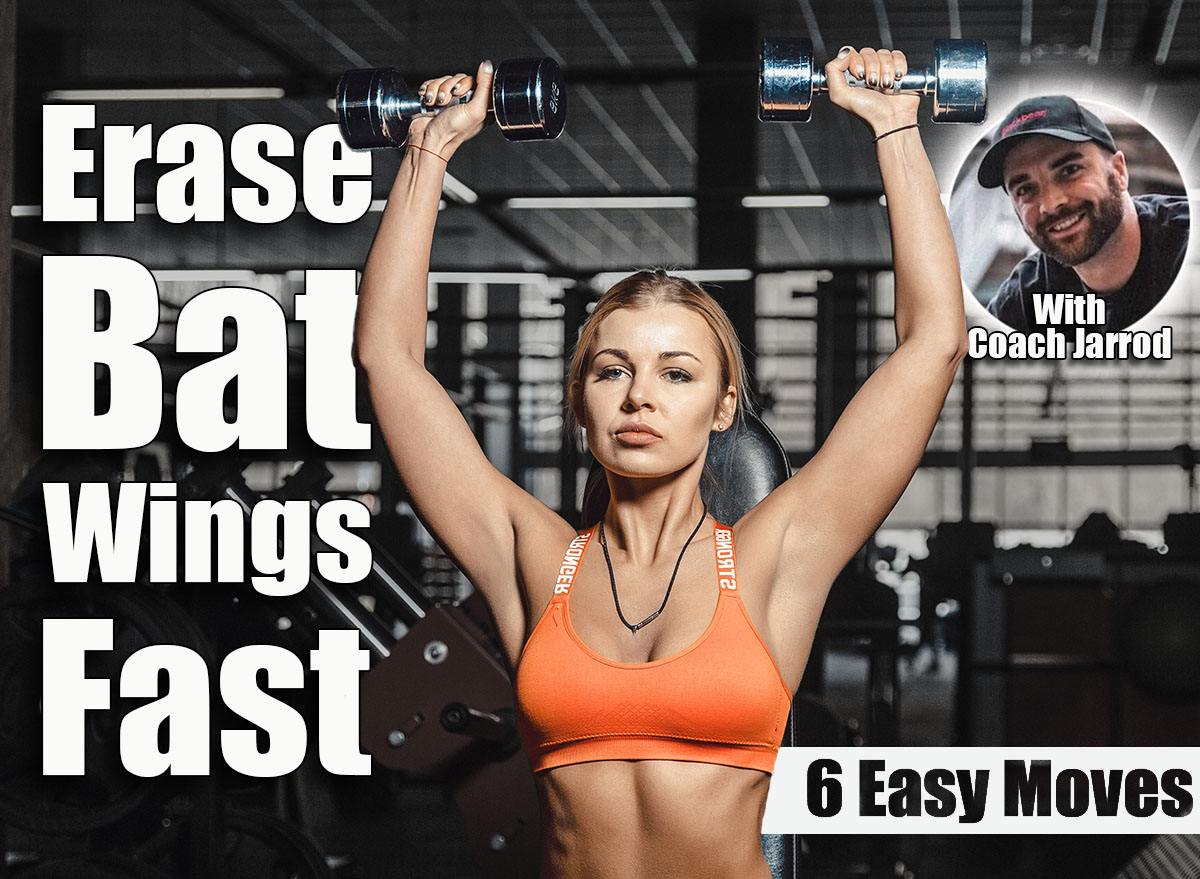
There’s no faster way to bring confidence back into a tank top or sleeveless dress than by firming up the arms that frame it. When these areas lose strength and tone, the skin follows, revealing the dreaded “bat wing” appearance.
To erase bat wings, you need to target the muscles that tighten and lift the back of your arms: the triceps, deltoids, and even the upper back. Together, these muscles act as your arm’s support system. Training them two to three times per week with focused, high-quality reps can improve definition, stability, and everyday function. With a solid game plan, you’ll soon find yourself building control, coordination, and endurance through resistance-based movement.
What separates practical exercises from ones that waste your time is how they challenge the muscle through a full range of motion and constant tension. Standing positions work particularly well because they engage your core and posture muscles simultaneously, creating a full-body tightening effect. With consistent effort, you’ll notice stronger, firmer arms that move with purpose and power.
Below, you’ll find six standing triceps and shoulder exercises that carve sleek lines, tighten the backs of your arms, and help your upper body feel decades younger—no floor work required.
6 Triceps & Shoulder Moves to Erase Bat Wings After 50
Standing Lateral Raise
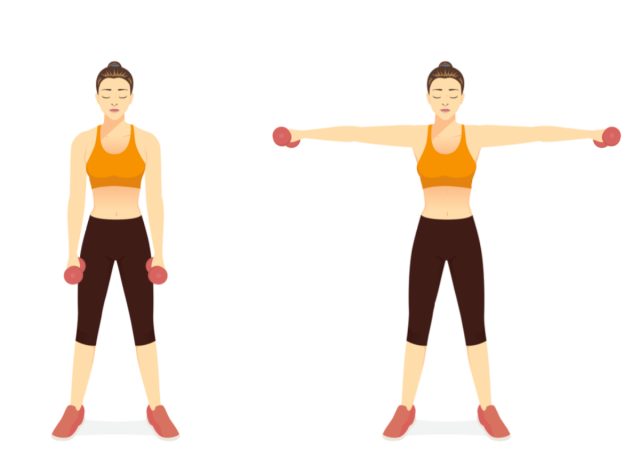
The lateral raise is a must-have exercise for shaping your shoulders and toning the tissue surrounding your upper arms. It targets the side delts, which give your shoulders their rounded appearance while assisting your triceps in arm extension. Building muscle in this region helps lift sagging areas and improves posture, giving your entire upper body a leaner, more balanced look.
Muscles Trained: Lateral deltoids, anterior deltoids, upper trapezius, triceps
How to Do It:
- Stand tall with your feet shoulder-width apart and dumbbells at your sides.
- Keep a slight bend in your elbows and brace your core.
- Raise your arms out to the sides until they reach shoulder height.
- Pause briefly at the top, then lower under control.
- Repeat for all reps while maintaining steady tension.
Recommended Sets and Reps: Perform 3 sets of 12 to 15 reps. Rest for 45 seconds between each set.
Best Variations: Seated lateral raise, single-arm cable lateral raise, banded lateral raise
Form Tip: Lead with your elbows, not your hands, to keep tension where it matters most.
Overhead Tricep Extension
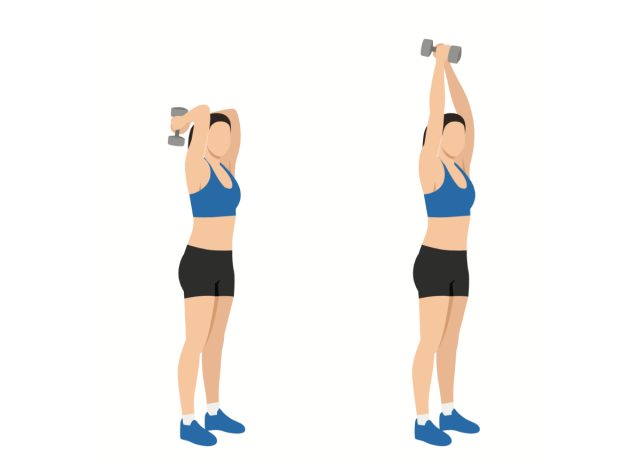
The overhead tricep extension isolates the long head of your triceps, which is the area responsible for the firmness on the back of your arms. Working this muscle through a stretched position maximizes muscle fiber activation and creates lasting tone. The more consistent you are with this movement, the more defined your upper arms will appear.
Muscles Trained: Triceps brachii (long head), deltoids, core stabilizers, lats
How to Do It:
- Stand with your feet hip-width apart, holding one dumbbell with both hands overhead.
- Keep your elbows close to your ears and your core tight.
- Slowly lower the weight behind your head until you feel a stretch in your triceps.
- Extend your arms back to the starting position, squeezing your triceps at the top.
- Control every rep from start to finish.
Recommended Sets and Reps: Perform 3 sets of 10 to 12 reps. Rest for 60 seconds between each set.
Best Variations: Single-arm overhead extension, cable rope extension, banded overhead extension
Form Tip: Keep your ribs down and elbows steady to prevent shifting the tension off your triceps.
Standing Front Delt Raise
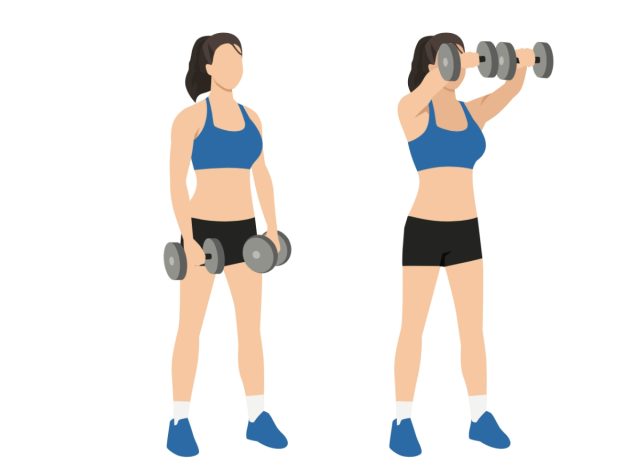
The front raise develops the anterior deltoid, the muscle that frames the front of your shoulder and enhances upper arm shape. This move also engages your upper chest and stabilizers, making your arms appear firmer and more sculpted. Strong front delts contribute to a balanced shoulder cap, which smooths the transition between the arm and torso.
Muscles Trained: Anterior deltoids, upper chest, biceps stabilizers, core
How to Do It:
- Stand with dumbbells resting in front of your thighs, palms facing down.
- Brace your core and slightly bend your elbows.
- Raise the weights straight in front of you to shoulder height.
- Hold briefly, then lower the weights slowly.
- Maintain tension throughout each rep.
Recommended Sets and Reps: Perform 3 sets of 10 to 12 reps. Rest for 45 seconds between each set.
Best Variations: Alternating front raise, cable front raise, plate raise
Form Tip: Keep your torso still and let your shoulders do the lifting.
Cable Tricep Pushdown
Few moves define the triceps like a proper pushdown. The cable’s continuous tension ensures the muscle works hard from start to finish, sculpting firmness and control through the entire arm. This move directly attacks the area most prone to sagging and helps restore upper-arm strength for everyday pushing and lifting tasks.
Muscles Trained: Triceps brachii, deltoids, forearms, core
How to Do It:
- Stand facing a cable machine with a straight bar or rope attached.
- Grip the handle with your elbows tucked by your sides.
- Push the handle down until your arms straighten.
- Squeeze your triceps, then return slowly to the start position.
- Avoid swinging or using your back for momentum.
Recommended Sets and Reps: Perform 3 sets of 12 to 15 reps. Rest for 45 seconds between each set.
Best Variations: Rope pushdown, reverse-grip pushdown, single-arm cable pushdown
Form Tip: Keep your elbows glued to your sides for optimal triceps engagement.
Staggered Stance Shoulder Press
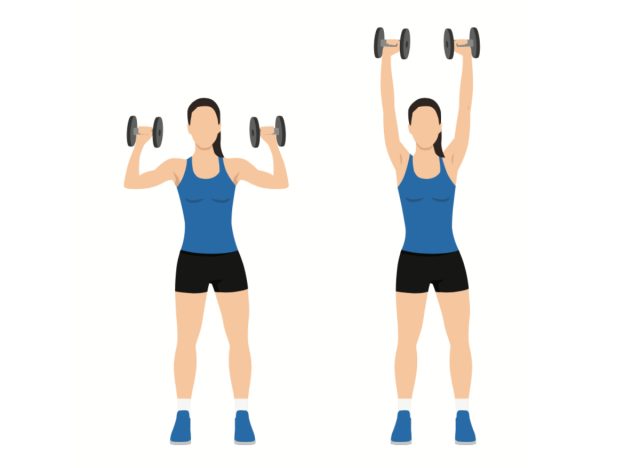
Pressing overhead builds strong, defined shoulders while improving upper body stability and posture. Using a staggered stance adds balance and core activation, making it an excellent full-body option for firming the arms and enhancing coordination. It builds endurance through the delts and triceps, leaving your upper body more capable and athletic.
Muscles Trained: Deltoids, triceps, upper chest, core
How to Do It:
- Stand with one foot forward and dumbbells at shoulder height.
- Brace your core and press both weights overhead until your arms straighten.
- Lower back down under control without letting your elbows flare too wide.
- Keep your spine tall and head neutral.
- Switch your lead foot halfway through your sets.
Recommended Sets and Reps: Perform 3 sets of 10 to 12 reps. Rest for 60 seconds between each set.
Best Variations: Alternating press, Arnold press, single-arm overhead press
Form Tip: Keep your core tight and ribs tucked to protect your lower back.
Band Pull-Aparts
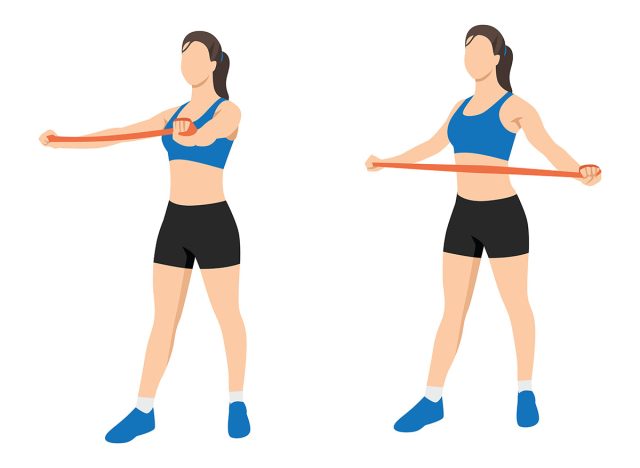
This underrated finisher strengthens the rear shoulders and upper back, critical areas for overall arm tone and posture. By targeting the muscles that retract your shoulder blades, you improve the appearance of your triceps and shoulders from every angle. Consistent band pull-aparts can also reduce stiffness and enhance arm definition.
Muscles Trained: Rear deltoids, rhomboids, middle trapezius, triceps
How to Do It:
- Hold a resistance band at shoulder height with your arms extended.
- Keep your shoulders relaxed and your palms facing down.
- Pull the band apart by squeezing your shoulder blades together.
- Pause briefly, then return to the starting position.
- Keep the motion smooth and controlled.
Recommended Sets and Reps: Perform 3 sets of 15 to 20 reps. Rest for 30 seconds between each set.
Best Variations: Diagonal band pull-aparts, single-arm pull-apart, behind-the-neck pull-apart
Form Tip: Think of pulling from your shoulder blades, not your hands.
The Best Actions for Erasing Bat Wings After 50
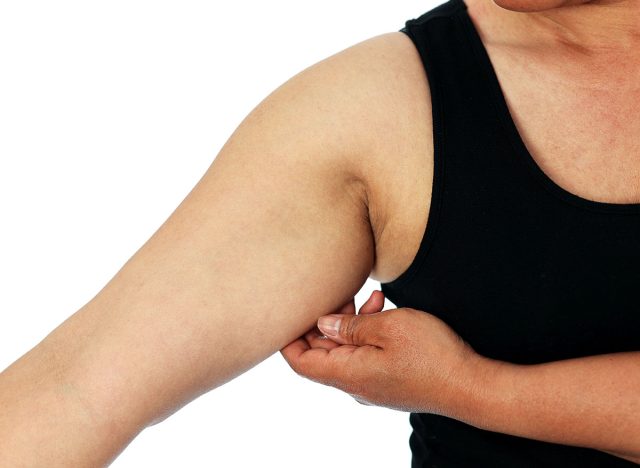
Consistency beats complexity. To firm your arms and shoulders, focus on progressive strength work, smart recovery, and a nutrient-rich diet that supports lean muscle growth. Each rep and each session adds up over time.
- Train your arms two to three times per week. Allow each muscle group at least one rest day between sessions to ensure optimal recovery and growth.
- Use resistance that challenges you. If the last few reps feel easy, your muscles aren’t challenged enough to adapt.
- Incorporate movement variety. Mix dumbbells, cables, and bands to challenge your muscles from multiple angles.
- Stay hydrated and prioritize protein. Proper nutrition is the unsung hero of muscle tone and recovery.
- Finish with stretch and mobility work. Gentle shoulder and triceps stretches improve circulation and muscle definition over time.